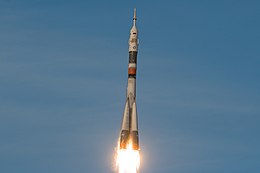cosmos.wikisort.org - Spacecraft
Soyuz MS-11 was a Soyuz spaceflight that launched on 3 December 2018, marking the 100th orbital launch of the year.[3] Originally scheduled for 20 December, the launch date was advanced to 3 December following the failure of Soyuz MS-10.[4] MS-11 was the 140th flight of a Soyuz spacecraft and carried the three members of the Expedition 58 crew to the International Space Station. The crew consisted of a Russian commander, and an American and a Canadian flight engineer.[3]
 The launch of Soyuz MS-11 | |
| Operator | Roscosmos |
|---|---|
| COSPAR ID | 2018-098A |
| SATCAT no. | 43756 |
| Mission duration | 203d 15h 15m 58s[1] |
| Distance travelled | 86,430,555 statute miles [2] |
| Orbits completed | 3264[1] |
| Spacecraft properties | |
| Spacecraft type | Soyuz-MS 11F747 No. 741 |
| Manufacturer | RKK Energia |
| Crew | |
| Crew size | 3 |
| Members | Oleg Kononenko Anne McClain David Saint-Jacques |
| Callsign | Antares |
| Start of mission | |
| Launch date | 3 December 2018, 11:31 UTC[3] |
| Rocket | Soyuz-FG |
| Launch site | Baikonur Pad 1/5 |
| End of mission | |
| Landing date | 25 June 2019, 02:47:50 UTC [1] |
| Landing site | 148 km SE of Dzheskasgan [1] |
| Orbital parameters | |
| Reference system | Geocentric |
| Regime | Low Earth |
| Inclination | 51.6º[1] |
| Docking with ISS | |
| Docking port | Poisk zenith |
| Docking date | 3 December 2018, 17:33 UTC |
| Undocking date | 24 June 2019, 23:25:30 UTC [1] |
| Time docked | 203d 5h 52m |
 (l-r) McClain, Kononenko and Saint-Jacques Soyuz programme (Crewed missions) | |
Crew
| Position | Crew member | |
|---|---|---|
| Commander | Expedition 58 Fourth spaceflight | |
| Flight Engineer 1 | Expedition 58 First spaceflight | |
| Flight Engineer 2 | Expedition 58 First spaceflight | |
Backup crew
| Position | Crew member | |
|---|---|---|
| Commander | ||
| Flight Engineer 1 | ||
| Flight Engineer 2 | ||
References
- Soyuz MS-11
- File:Statistics from the Exp 58 and 59 crew.png
- Gebhardt, Chris. "100th orbital launch of 2018: International trio set for launch to Space Station – NASASpaceFlight.com". NASASpaceflight.com. Retrieved 3 December 2018.
- "Назначены даты отправки и возвращения с МКС космонавтов после аварии на Байконуре" [Dates assigned for next flights of cosmonauts to and from the ISS after the Baikonur incident] (in Russian). Interfax. October 21, 2018. Retrieved October 22, 2018.
На других языках
- [en] Soyuz MS-11
[es] Soyuz MS-11
Soyuz MS-11 es un vuelo espacial Soyuz, lanzado el 3 de diciembre de 2018. Luego del accidente de Soyuz MS-10, su lanzamiento fue adelantado dos semanas.[2][ru] Союз МС-11
Союз МС-11 (№ 741, ISS-57S) — российский транспортный пилотируемый космический корабль, запуск которого к Международной космической станции состоялся 3 декабря 2018 года[5]. На станцию доставлены трое участников экспедиций МКС-57 и 58/59. Запуск осуществлен ракетой-носителем «Союз-ФГ» с космодрома Байконур. Это 138-й пилотируемый полёт корабля «Союз», первый полёт которого состоялся в 1967 году.Текст в блоке "Читать" взят с сайта "Википедия" и доступен по лицензии Creative Commons Attribution-ShareAlike; в отдельных случаях могут действовать дополнительные условия.
Другой контент может иметь иную лицензию. Перед использованием материалов сайта WikiSort.org внимательно изучите правила лицензирования конкретных элементов наполнения сайта.
Другой контент может иметь иную лицензию. Перед использованием материалов сайта WikiSort.org внимательно изучите правила лицензирования конкретных элементов наполнения сайта.
2019-2025
WikiSort.org - проект по пересортировке и дополнению контента Википедии
WikiSort.org - проект по пересортировке и дополнению контента Википедии


